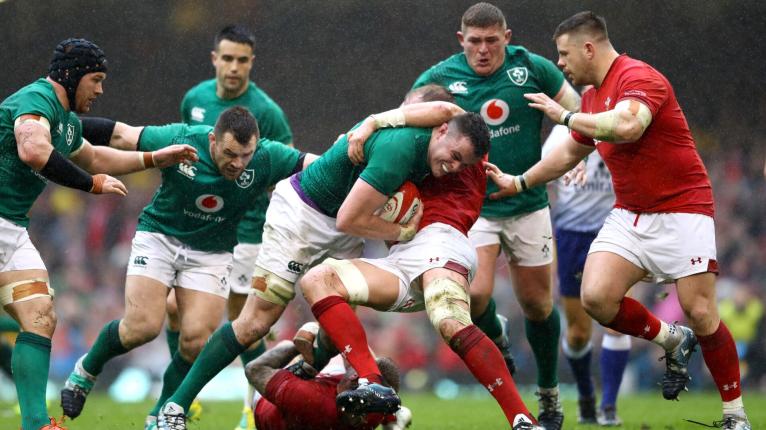Wales were crowned Six Nations Grand Slam champions as they demolished Ireland 25-7 in Cardiff to claim European rugby’s glittering double prize.
The Principality Stadium threatened to lift from its foundations, with Wales making it 14 games unbeaten and giving head coach Warren Gatland a record-breaking Six Nations swansong.
Gatland’s final Six Nations game – he leaves Wales after the World Cup later this year – saw him become the first coach in Five or Six Nations history to win three Grand Slams.
Gareth Anscombe kicked 20 points – six penalties and the conversion of centre Hadleigh Parkes’ second-minute try – to sink Ireland in swirling rain under leaden skies on an afternoon when the visitors insisted the stadium roof remained open.
Ireland were washed away as Wales completed a first Six Nations clean sweep for seven years – a tournament record fourth Grand Slam – and landed their first Six Nations title since 2013, while also climbing above Ireland to second in the official world rankings.
WAL 25-7 IRE
Wales have done it! Capturing the Triple Crown and the Grand Slam in Cardiff with their 14th win on the bounce.
Diweddglo chwedlonol i'r ymgyrch Chwe Gwlad?, wedi ei sefydlu ar waith caled a chyfeillgarwch.
??????? #HWFN #ForTheJersey pic.twitter.com/nA5XgpNLEz
— Welsh Rugby Union ??????? (@WelshRugbyUnion) March 16, 2019
The outcome was never in doubt once Anscombe and Parkes combined to cut Ireland open after just 70 seconds, with the visitors’ only points coming from Jordan Larmour’s 80th-minute touchdown that his fellow replacement Jack Carty converted.
Ireland went into the game with an outside chance of title success, but the final Six Nations game for head coach Joe Schmidt and captain Rory Best will quickly be erased from the memory.
Wales have now claimed four Grand Slams in 15 seasons – 2005, 2008, 2012 and 2019 – and they will head to the World Cup six months from now as major title contenders.

Wales were unchanged from the side that beat Scotland at Murrayfield last weekend, while Ireland showed three switches as full-back Rob Kearney, flanker Sean O’Brien and lock Tadhg Beirne, who made his Six Nations debut, all started.
The stadium roof was open at Ireland’s request, but with a forecast of gale-force winds it was Wales that blew the game wide open with a brilliant early try.
Wales’ forwards laid the foundations, driving forcefully from a lineout, but the try owed everything to Anscombe, whose sublime angled kick off the outside off his right boot was caught by Parkes.
The Scarlets centre took his chance superbly, with Anscombe’s conversion making it 7-0, before Parkes then turned defender to pull off a stunning try-saving tackle on Ireland wing Jacob Stockdale.
Wales were then forced into a major reshuffle when wing George North was forced off injured. Dan Biggar replaced him, with Anscombe moving to full-back and Liam Williams switching to wing duties.
Anscombe, though, was not remotely knocked out of his stride and he kicked a penalty from just inside Ireland’s half to put Wales 10-0 ahead after 17 minutes.
It should have arguably been more just three minutes later, but Wales saw a penalty award reversed following a challenge by scrum-half Gareth Davies on Ireland centre Bundee Aki.
Ireland dominated in terms of territory during the third quarter, but they encountered a Wales defence as resilient and defiant as it had been in repelling Scotland seven days ago.
Another Anscombe penalty opened up a 13-point lead as the interval approached and, with the rain pouring down, Ireland appeared more miserable than the weather, being dominated by a title-hungry Wales team.
Anscombe then completed his penalty hat-trick, and Wales trooped off 16-0 ahead, 40 minutes from glory.
He then put the issue beyond doubt with two penalties during the third quarter, before adding another penalty 10 minutes from time and the celebrations could begin after one of Wales’ most dominant displays in recent memory.
It was a day when they rose to the occasion majestically, inspired by a number of world-class individual displays, but none more so than Anscombe’s as he came of age as a Test match performer.
























































































